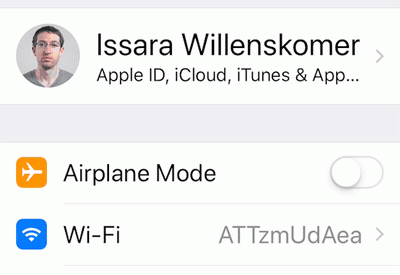This is my personal journey of developing and overcoming iPhone addiction. As a person who works in tech and the world of digital products, I hope my story proves even more salient.
If even a single person is helped by my story (and returned to their family and the world), the journey will have been worth it.
Before I jump in, I need to say: this is not an essay about a hypothetical series of 9 steps you can do, if the mood strikes. This is an essay about what I did to my phone and why I did it: to permanently destroy my addictive relationship with my smartphone.
I will be taking you through the settings that have been on my phone for the last 2 years. None of this is theory based. This is what worked.
I received my first smartphone (iPhone 1) as a bonus for a project that I had kicked ass on. Over several months, I had written, designed, produced, shot, built a team, casted, and animated a 3 minute ?vision video? imagining the future of online shopping . The project went on to win a minor design award, which felt good.
What felt even better was the insanely futuristic object I now held in my hand.
Over the next 10 years (and several generations of iPhones) my admiration would turn into addiction and a love/hate relationship with technology and myself.
At first, the behavioral modification and incremental dopamine rewards started slow.
It started with me loading my email onto my phone, a few apps here, a few apps there, Facebook and Twitter. Not much. I wasn?t into gaming. I wasn?t into watching movies. I wasn?t into a lot of stuff. I was, however, into news. And, as it turns out, dating (more specifically flirting over text).
News and dating. And responding to email.
That?s pretty much it. I know it sounds insanely mild. But what?s weirder is how compulsively I began checking this thing. Soon every time it vibrated (my phone vibration has now been disabled for years), or when I thought it vibrated, it would be out of my pocket in a flash, my little personal dopamine spigot.
And thus began the great battle.
The battle was this: even as I became more addicted and unable to control my own behavior, even as this object became more and more firmly woven into the fabric of my life, even as I spent more and more time on it, doing repetitive useless things, I remained conscious and self aware, helplessly watching myself lose control and turn into this weirdly compulsive person.
It was horrible.
And somewhat bewildering. People who know me will likely be surprised by this story. I love being outdoors and in nature. I love taking long walks, and just thinking, usually by myself. Conversely, I do not love technology (even before this story happened). I never have. Technology has always felt cheap and inauthentic next to the miraculous grandeur of our Avatar-like world. Why bother?
Even at this phase of behavioral reprogramming, it didn?t become a true positive feedback loop until I tried to consciously modify my own behavior.
When I tried to stop compulsively using my phone, I found that I simply couldn?t. This would cause me anxiety as I watched myself try and fail. Try and fail. Over and over. I was out of control.
It was making me anxious.
The anxiety became a trigger that I needed to manage. I would do so via the little dopamine pleasure squirts I got by being on my phone. Cycle complete. Positive feedback loop acquired. I was fucked.
Contrary to other folks, the impact on me was more internal than external. I never lost my job. I never lost my relationships (though it ended up straining them). My productivity did become impacted, but I kept being good at my job. I wasn?t blowing money on shit for my phone. I don?t have kids (that I know of), so I wasn?t that parent that we all love to hate on. I wasn?t ruining my life. Externally or visibly.
But internally (and maybe I?m biased, but sometimes I feel like that?s where it?s worse), I was becoming destroyed.
I grew up shy, out on a dirt road in rural northern Calfornia. We had solar and gardened. My parents owned a small bookstore. I spent a lot of time by myself out in nature. I had a hard time making friends and talking to girls. When I finally broke through, I discovered that I was quite good at what I did (photography, design, filmmaking, ideating). These things changed my life. I became more confident, more ?in the world.?
Seeing myself crumble like this over a period of years, over completely minor shit (I know, some folks have deep major mobile addiction issues with games, porn, and other stuff), was devastating. And this devastation became the fuel that fed the beast.
Every time I felt bad about myself, I would (now automatically) pull out my phone and check the news or flirt with a girl, or check my social media, or whatever. It didn?t matter really. All that mattered was to interrupt this shitty feeling I had about myself.
I slept with my phone next to me. It was always on. And it sucked because my job was to research, know about, and be aware of digital products.
This went on for years.
Finally, I woke the fuck up.
For your sanity (and mine) I?m going to fast forward past all the shit I tried and failed at.
Essentially, there is only one thing that works. It will work 100% of the time (assuming you can?t just get rid of your phone). The other things on my list are what to do in addition to the first thing. If you skip Step 1, I cannot vouch for your results.
The thing that took me years to figure out and that I kept resisting is this: I had to remove my willpower from the equation.
But how could I possibly do this if the whole point of the smartphone is ?unlimited access?, ?ease-of-use?, and ?letting you know (notifying)? when something happens?
I had to attack all 3. Unlimited access, ease-of-use, and ?notifications? (a true plague on your attention if ever there was one) were about to get their asses kicked.
The following is my 3 pronged strategy to permanently destroy phone addiction:
- Regarding ?unlimited access? you have to limit it, block yourself, and remove yourself from the equation. Know when you?re beat. The heroin is simply too delicious.
- Regarding ?ease of use,? you have to build multiple layers of friction. The multiple layers synergize and degrade your compulsivity.
- Regarding ?letting you know (notifications),? you need to disable them (this includes sounds and vibrations, badges, those red blob things, etc., anything where your phone is requesting your attention in interruptive ways).
Such is the gospel of the heretic.
Here?s the thing: you have to be so completely fed up and demoralized that you will give yourself over to a higher power (haha not god (who doesn?t exist, sorry) but someone else, a physical person).
If you?re not there yet, no worries, wait a bit longer, than come back and read the following.
This is the big step. You have to attack ?unlimited access.?
It may help if you think of it this way. If you?re an alcoholic and you have a bottle of your favorite drink in your pocket ? all day long, it will exhaust you and you will fail at not drinking it.
You need to get the bottle out of your pocket. Except in this case, you can?t, because this is a magic bottle of alcohol that does many different useful things, and is always permanently refilling itself.
Some of those things you actually do need in order to function in society. The trick is determining which ones you legitimately need and which ones you are convinced you need.
I figured out that I need 3 critical things: phone, text, maps/navigator. The rest are a spectrum of nice-to-haves (Yelp, Mail, etc.) and pure-fucking-uncut-heroin (Facebook, Twitter, Safari).
Here?s the conversation you can have with the person (higher power) who is going to help you with this (for me it was my girlfriend).
?Hey girl, so you know how I?ve struggled with my phone addiction thing? I am turning on parental controls and I would like you to (I handed her my phone and looked away) create a password now. I need you to not forget it, and never tell me what it is.?
The way that ?parental controls? works is that the ?parent? first sets up a password that only they have access to. iOS has renamed this feature from ?Parental Controls? to ?Screen Time?, and made it way more powerful. After creating a password, the ?parent (you)? can configure what is allowed and when. This is what you need to set up.
(I took one for the team. In recording these videos, my girlfriend had to enter her password. After filming this, I requested that she change it.)
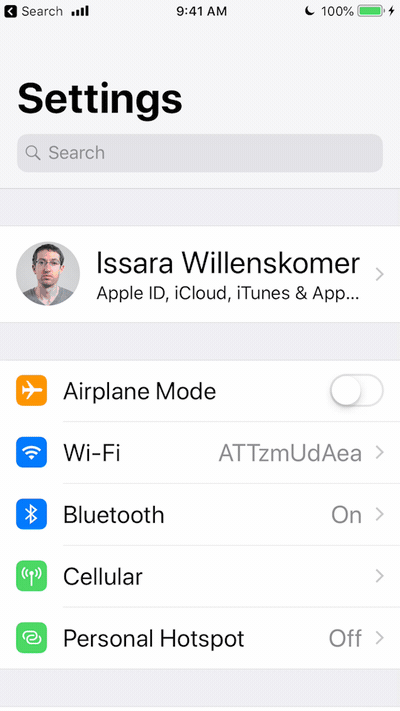
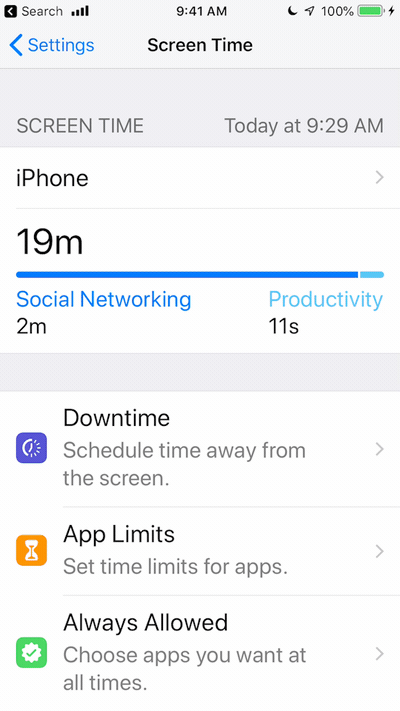
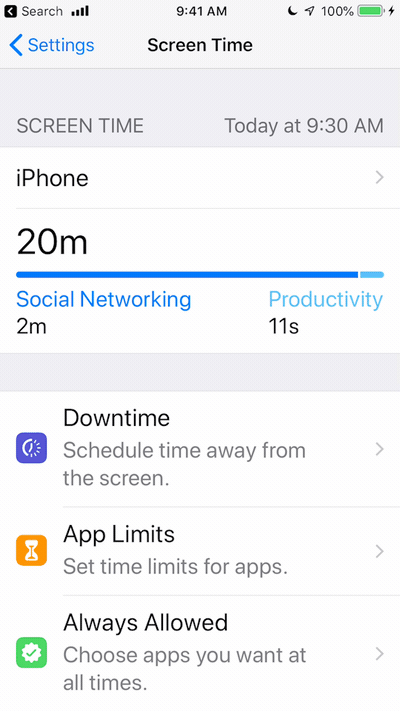 Screen Time: disabling app downloads, disabling Safari, setting time blocks
Screen Time: disabling app downloads, disabling Safari, setting time blocks
With this feature now engaged, I eagerly (because yes, I do get excited about having my life back) disabled everything that was fucking with me. In my case this meant all apps, including Safari (my thing is compulsively reading news), and the ability to download new apps. This second part is critical.
You have to start thinking of your mind like a little weasel that you need to trap in a landscape of possible escapes.
I pretty much reduced my $500 iPhone down to phone, text and navigation. I was ecstatic. Why hadn?t I done this earlier?
The short answer is this ? the future is opaque and the only reason we can ask this question to begin with, is because of what are fondly termed the narrativity and hindsight biases. Put more simply, we often fail to recognize after we discover the solution that before we discover the solution, we were unable to see it (no matter how obvious in hindsight). This is a tale for another time.
I know what you?re thinking: I can?t do this. It will ruin my life.
I thought so too. It was really scary and I first did it for a trial basis. But I got my life back. So the trial basis became permanent. I did this several years ago. I have no ability to use a browser on my phone. Even if I want to. And sometimes, I really need to look things up.
But guess what? I really like not being addicted to my phone even more than I really want to look something up.
Honestly, this step alone might save your life and maybe you?re good to go.
But my goal wasn?t to just break my addiction, my goal was to transform my relationship to this object which held a weird and inexplicable power over me.
My goal was to destroy this relationship. Permanently.
I was that pissed.
Step 2: disable all sounds and vibrations
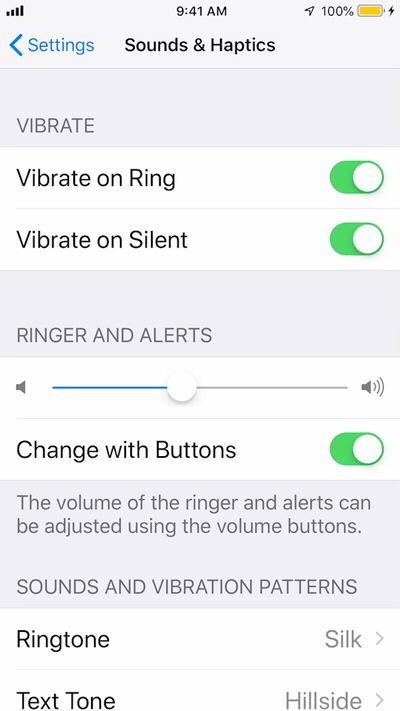 Vibrate: should only be used for fun.
Vibrate: should only be used for fun.
In case it?s not obvious yet, my goal here is to have you be like me and turn your phone into something with the functionality and features just barely above the level of a brick.
So, on my phone, all sounds and vibrations are off. Plus the physical switch is in the quiet mode. Simple. Done.
Step 3: ditch your email
I know this sounds nuts and you may feel like this is your breaking point. I resisted this. Hard.
But check it out: I have an online business which is 100% email based. I can personally guarantee that between the two of us, I need email on my phone more than you. I would be insane to do this.
I am and I did.
And it. Will. Change. Your. Life.
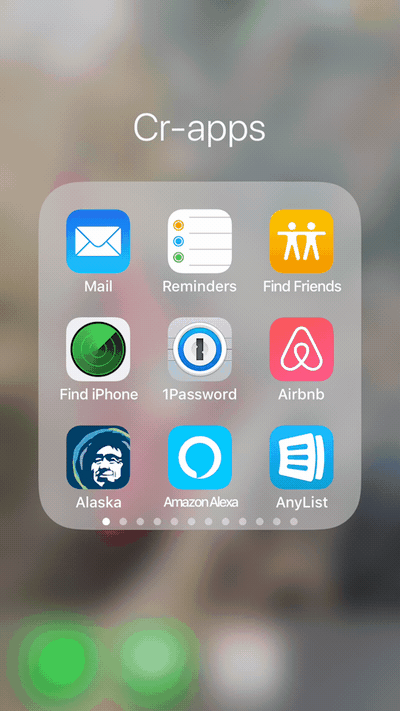 Email is not text.
Email is not text.
Granted, some people may not hear back from you instantly but guess what? Email isn?t text messaging. I had to train certain folks and be in communcation about this. I was so addicted to my phone that email had basically become text messaging.
I had been replying nearly instantly because I checked my email continuously. All hail the mighty dopamine.
Straight talk: if you?ve been conditioning and training people in your life that you will respond nearly instantly to email, than guess what? You now get to train and condition them that you won?t.
This means that I had to have the following conversation (basically this article that you?re reading) in a minute or two and let them know that I?d be checking my email and replying to them not instantly. The great thing is that people on your team are (hopefully) really cool and completely understanding. The conversation went something like this.
?Hey you/they,? (respect people?s gender pronouns!) ?I just wanted to let you know that I?ve been struggling with compulsivity with my phone. It?s having an impact on my work and my mood, so I?m setting up a system where I check my email twice a day. I believe this will make me more productive and less distracted. If something urgent comes up, you can call/text me. Thank you for your understanding with this.?
This will likely create a little more friction and anxiety in your life. And now I?m a bit more behind on my email (this is not a story about how I got good at email). So in this case, there is a bit of a trade off.
To paraphrase Nicholas Nassim Taleb, there is asymmetry between the upside and the downside. The small downside (a little more friction) is fundamentally asymmetrical to the insanely large payoff of not being an addict.
Step 4: delete all social media apps
At this point, we?re just mopping up. The delicious heroin needs to go. And because you are awesome, you disabled the ?allow app downloads? when you set your parental controls. So once you delete these apps from your phone, you are unable to re-download them.
Also in parental controls: make sure you disabled the ?allow in-app purchases? thing as well, because you care about your future that much.
Look, this isn?t supposed to be easy or feel good. The entire point of why you need to do this in the first place is because you?ve been modifying your behavior over the last 10+ years. In order to do a full stop like this, it?s going to suck, it?s going to disrupt your shit. There?s no way around it. You?re detoxing. This is an intervention. It?s not supposed to feel good.
Another thought on ?feeling good.? Feeling good is your inner child. About 80 or so years ago, psychologists realized that they could hack primitive human emotions to get people to buy more shit (our modern economy). One of those levers is your need to feel good. People get paid a lot of money to figure out how to get you to identify with (and depend on) feeling good.
Then they figure out what products they can sell you to feel good. Feeling good is your inner child talking. You are now an adult. It?s time to grow the fuck up. (I don?t mean to sound like a Puritan on this, but seriously).
Look, in case nobody told you, it?s about time you heard it: life is not about feeling good. Life is about adding value. Life is about ethics, it?s about the long-term, and managing risk so that your children (if you have them), have a future. It?s about taking responsibility and growing as a person. Pursuing ?feeling good? is a short term emotional outcome that got you into this mess in the first place.
Prior to psychologists discovering the ego and businesses using every possible psychological lever imaginable to sell you shit you don?t need, people prioritized things other than feeling good. You?re living inside of an invented paradigm. This is, unfortunately, a story for another time.
Make no mistake, this is an intervention. You are intervening in your own life, because nobody can or will do it for you.
You are standing up for having a higher quality of life, being out in the world, being a better parent, a better husband, wife, mother, daughter, person, uncle, a better human on this planet.
Step 5: colors
This one is super weird. Basically there?s a feature where you can turn your phone greyscale. And automate it with a triple click. So I did.
And it changed my life.
What I never realized, even after spending over 20 years designing digital products, is how colors completely hijack your attention and drain your energy.
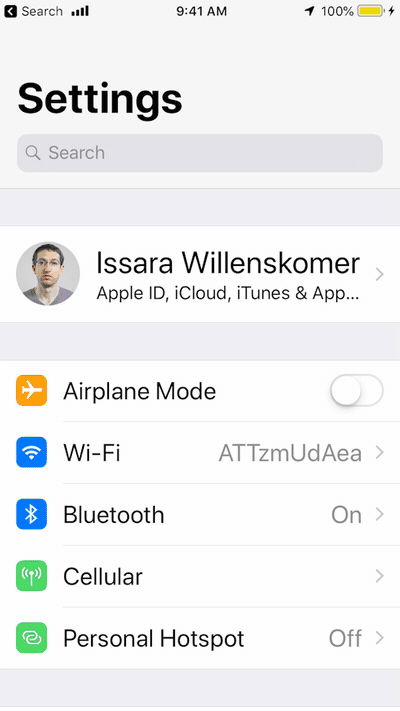 Color is insaaaane.
Color is insaaaane.
The first few minutes will be really weird. The first day will still be weird. Now I just leave my phone in greyscale. The only time I triple click and bring color back is when I?m teaching a workshop (on motion in digital products), or sometimes when I?m driving and need to quickly scan Waze.
To me, this is a total pro move.
Once you do this and use your phone in greyscale for a few weeks, when you bring color back on, you will have a huge ?what the fuck? moment, where you realize how insane colors are.
If you?re reading this and you?re a designer like me, it will blow your mind.
Step 6: drop the white point
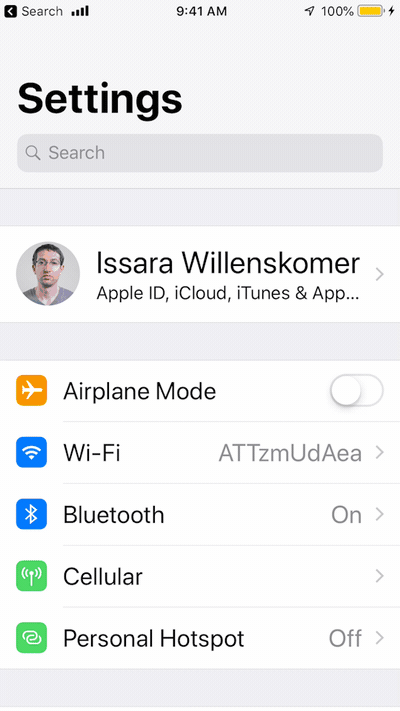 Be right, not white.
Be right, not white.
One of the things I noticed that kept hijacking my attention and draining my energy was how physically bright my device is. It?s weirdly bright. Nothing in the real world is this bright (except the sun and reflections of the sun).
There?s a little known feature in iOS where you can actually set the white point. This is different than brightness.
You can drop the white point so low that it?s nearly impossible to read your screen in daylight. You can use this feature with the default iOS brightness feature to make your screen insanely dim.
It?s perfect. Again, we are building friction into something that is predicated on ?ease-of-use?, which combined with instant feedback biases certain people (possibly you) towards addiction.
There are a few times where I do need to use my phone at night. What I?ve found is that even at the lowest brightness setting, at night my phone is still insanely bright. When you drop the white point and keep it in black and white, you?re set.
Again, this hack works awesome with the greyscale feature.
Step 7: font size
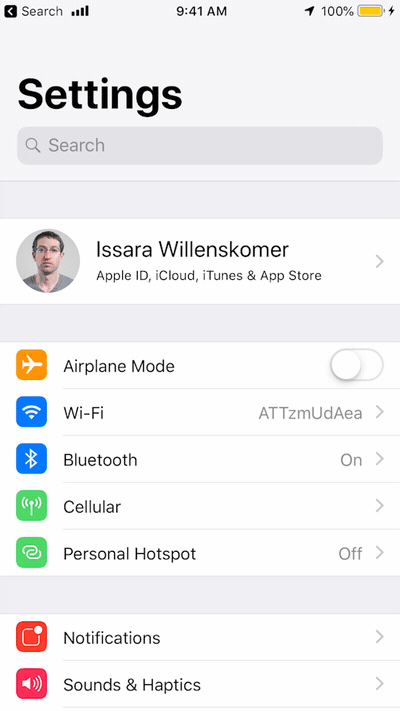 Embiggen with relish.
Embiggen with relish.
This is a weird little hack that made a huge difference. I can?t explain why and I don?t have a theory (again, theories are fragile, data is robust), other than changing the object somehow changes how I relate to it, and my mental and behavioral model. Who knows.
In any event, it shakes things up and creates more friction. Personally, I recommend going really big with your font. Just to mess with you. That?s what I have on my phone.
Step 8: disable all notifications
Whenever I install an app (because I need to for my job) and it asks me if I accept notifications, I always wish there was a ?fuck no? button. The ?no? button just doesn?t fully express my sentiment.
Nothing (in my opinion) is as harmful to your attention as notifications. They constantly interrupt your flow. In nearly all cases, I find the benefit of notifications to be utterly asymmetrical to the harm they cause. Meaning that while you may now have more information, this information comes at a steep cost to your mental health. Fuck ?em.
The notifications I leave on are for my calendar, texts and Lyft (those drivers are sooo much happier than Uber drivers, just ask them). You can definitely play with this and find your sweet spot. It takes a few minutes to go down the settings and disable notifications for every app. Your child, husband/wife/person, pet chicken will thank you.
Step 9: get it the fuck away from you
This may seem obvious but my phone is rarely in my bedroom. In fact, one of the more pleasurable activities I have is when I physically turn my phone off. Like off off. And then forget about it for a day or two.
Or even better, misplace it for several days, and then spend a minimal amount of time searching for it before moving on to more rewarding things (like stressing out about climate change).
Thus concludes my 9 hardcore steps to destroying your phone addiction. The following are 3 hardcore bonus steps that I highly recommend you dial in to optimize peak phone addiction destruction performance. I have done all of these. They work great.
Bonus step 1: organize poorly
This bonus step is yet another way of attacking the fundamental properties that led to your addiction in the first place: unlimited access and ease of use.
The idea here is that over time you start generating frictionless mental models of the apps and interface of your phone. In fact, designers build products with this in mind. This can be a great thing, but I find that ease-of-use promotes addiction.
We attack ease-of-use with friction.
I assert that part of the ultimate problem here is that some people are simply more susceptible to becoming addicted than others. (You can develop your own theories around this but as Nicholas Nassim Taleb likes to say, theories are fragile, data is robust.)
I am one of those people. My girlfriend (who is also in UX and works at Amazon) is thankfully not one of those people.
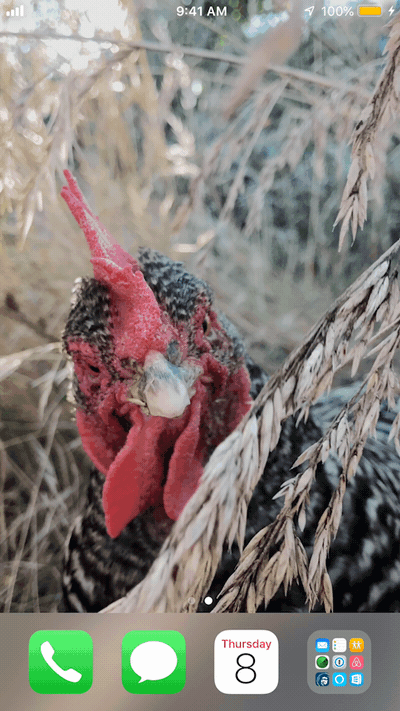 I like to imagine that Jana is judging me.
I like to imagine that Jana is judging me.
She seems to be pretty immune to everything that I?ve written about here. If you?re like her, that?s awesome. If you?re like me, that sucks, but hopefully you learned some hardcore things you can do to take control of your behavior and remove your willpower.
Part of the remedy is to build in friction. I took all my apps and tossed them in a ?Cr-apps? folder.
See screenshot to the left.
This fundamentally changes the user flow. Now I have to search by typing, which is less visual than finding the icon and stabbing it with my finger.
That?s my chicken Jana, by the way. Because she is a dinosaur, she has no idea that thousands of people are now looking at her dinosaur face.
Though knowing her as well as I do, I doubt she?d care.
Bonus step 2: do not disturb
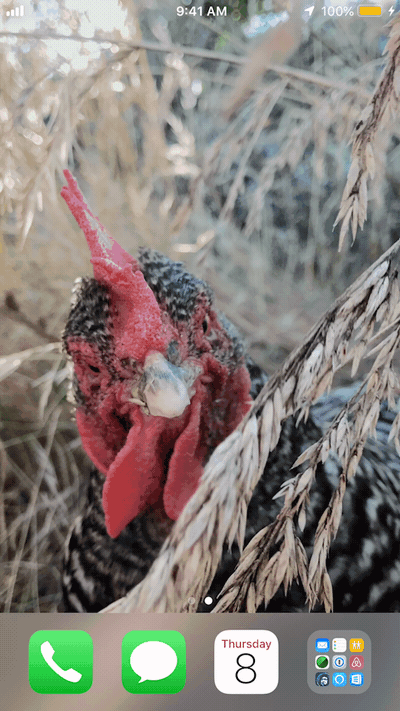 Totally worth it.
Totally worth it.
In the world of phone addiction, this one is a bit of a trope, but the ?do not disturb? setting can seriously change your life.
I leave it on most of the time. It basically means that if someone calls or texts you, you?ll never know. Because all sounds are disabled (Step 2), as well as vibrate, I usually don?t know anyway. Perfect.
Look, this is about changing your habits and patterns. Yes there will be an impact. Sometimes you will miss an important call or text. Big whoop. Get over it. You?re probably not that special anyway, from a Bayesian probability standpoint, no matter how many Facebook friends you have.
It?s way more important to have your life back.
Bonus step 3: disable those stupid red badge notification alert blob things
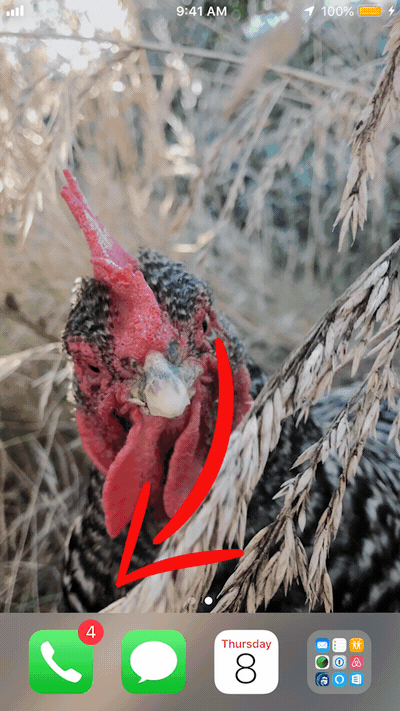 Goodbye red blobs.
Goodbye red blobs.
I?ll be honest, I don?t do this a lot, though I have played with it, and I give it my full endorsement. This is an extra hardcore step and if you take it, I salute you. Mad respect.
Basically, those little red blobs with numbers exist to tell you something, like a new text or call. You can disable those. It?s extremely satisfying. If you do, you?ll have to remember to check the phone and messages app (or don?t, you won?t die).
I do enjoy disabling those red blobs but I also find it weirdly disquieting and somewhat disorienting. So in general, I keep them on.
You should know: these things are like mini-notifications, always hijacking your attention and modifying your behavior. Unlike notifications, they?re always on, so in one sense they?re worse because they?re always robbing your energy until they end up forcing you to deal with them.
Pretty much anything that is compelling you to modify your behavior should be considered highly suspect, and needs a strong reason to exist.
In my opinion, as designers, when we design features, we need to consider harm way more than benefit. Sadly, that is a tale for another time, and probably about design ethics.
I?m going to wrap this up by saying I know how insanely radical what I?ve proposed sounds. I?m essentially advocating for you turning your amazing expensive gadget smartphone status symbol thing into a fairly useless and difficult to use brick.
In fact, a brick may end up being easier to use after you?ve implemented what I recommend.
Look, you may really believe that you need email on your phone. You may really believe you need your Facebook and Instagram. I don?t know, maybe you really do. You could be in that .00000000001% of people reading this who need those apps to save species from extinction, and somehow these apps allow you to do that in realtime. If that?s the case, I?d rather you stay addicted and unhappy, if it means fewer species go extinct.
Going out on a limb here, I?m going to assert you are not that person. You?re probably just like me: convincing yourself that you can?t afford to do the things that absolutely 100% will work and give you your life back.
Or that the 3% benefit you get from these shitty apps/games (sorry guys), is worth the 97% of your internal struggle and misery.
I challenge you to try it for a day and see how it goes. If you don?t die, try it for another day.
It is going to hurt. I?m not going to lie. Essentially, the way your central nervous system works with repetitive behavior is that habits = survival.
Your habits haven?t killed you and evolutionarily that?s a massive win. So your nervous system rewards your habits with dopamine and trains you to keep doing those things. Over time, between the dopamine and the myelination that happens to neurons recruited for repetitive tasks, you?re pretty much hardwired to not change.
That?s why habits are nearly impossible to break. You?re fighting billions of years of evolution that favors habits. This is a fight you probably won?t win. Sorry Enlightenment. Hello post-Enlightment.
Which is why I advocate this method. When you remove your willpower as a factor (see Step 1: parental controls), it no longer matters what you feel. You simply are unable to do the things you are compelled to do.
It has rendered your addiction irrelevant.
It?s pretty much that simple (even though it?s clearly not because we?re talking about highly evolved insanely complex organic systems with cascading feedback loops, but that?s a tale for another time).
Just know for now that breaking habits runs against pretty much everything that you evolved for. So the way this surfaces up into your consciousness is as a sensation that you label as anxiety, stress, or feeling uncomfortable.
These labels then get translated into self talk and language like, ?Oh crap, why did I listen to Issara? This is a terrible idea. I?m now totally locked out of all my shit.?
So it goes.
And this sensation will go away. You will get your life back and you will have permanently shattered your phone addiction.
And even if you?re still left frothing at the mouth, pawing at your device like some mindless crazed phone zombie (hello Seattle Southlake Union, I see you even from Santa Cruz), guess what ? you still can?t access your stuff or download new apps! You will be forced to have your life back.
It?s so awesome.
Epilogue
Shit, if you made it this far, what can I say, you?re a champ and must really be hurting. Hit me up if you need some support. You can reach me at [email protected]. I may take a bit to get back to you, but I will.
Even though I?ve destroyed my phone addiction I still need to be vigilant. There are occasions where I need to disable my settings and get online. When I do, it can quickly spiral out of control. When this happens, I quickly enable my parental controls and my phone goes back to being? well, a phone.
Good luck and let me know how it goes.
